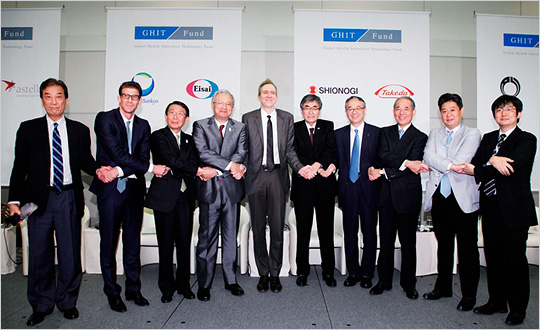July 11, 2013
The boundary separating poverty and prosperity in many countries and regions around the world can be removed through the elimination of infectious diseases. In the belief that “health is an essential factor for sound economic activity,” Japan, as one of the major development assistance countries worldwide, has been assisting developing countries in many ways, including through the donation of medicines, development of infrastructure, and human resources. This development assistance is being promoted by both the Government of Japan and private sectors. In addition to these activities and with the aim of proactively advancing Japan's contribution to the elimination of neglected tropical diseases (NTDs) through that country's world-class drug discovery capabilities, the Government of Japan (the Ministry of Foreign Affairs (MOFA) and the Ministry of Health, Labour and Welfare (MHLW)); a consortium of five major Japanese pharmaceutical companies, including Eisai Co., Ltd.; and the Bill & Melinda Gates Foundation co-established the Global Health Innovative Technology Fund (GHIT Fund) in November 2012 (https://www.eisai.com/news/news201319.html). It is the first public–private partnership founded in Japan to combat infectious diseases in the global health field.
Joint Press Conference of GHIT Fund: Japan's Contribution to Global Health through Public–Private Partnership
Representatives of the GHIT Fund (http://ghitfund.org/en/), the Government of Japan (MOFA and MHLW), the five pharmaceutical companies and the Bill & Melinda Gates Foundation participated in a joint press conference held in Yokohama, Japan on June 1, 2013. The press conference was held in the form of a panel discussion.
Haruo Naito, President and CEO of Eisai Co., Ltd, summarized his reason for participation in the GHIT fund as follows:
“Return on investment in health and welfare in developing countries should consider the long-term. In the long-term, people suffering from disease will be able to overcome their diseases and engage in economic activities, contributing to national income and national wealth and eventually creating a large middle-income class. This is a long-term investment for future market growth.
Improving access to medicine and global health is not a simple issue. Access to medicine consists of four pillars.
- Availability of medicine to patients
- Affordability of medicine to patients EMedicine should be affordable to all members of society.
- Adoption (willingness to take medicine) EEven when medicine is available and affordable, the patients' willingness to take the medicine remains very important. To this end, education in disease awareness and disease control plays a key role.
- Architecture (basic systems and structures necessary for improvement of access to medicine) EArchitecture such as basic medical infrastructure, hygiene, and water supplies are crucial.
Working alone, the pharmaceutical industry is limited in what it is able to achieve in regard to these four pillars. That is why partnerships with governmental and international organizations such as the Bill & Melinda Gates Foundation are necessary. The first partnership of its kind, the GHIT Fund is an epoch-making concept as it brings together the Bill & Melinda Gates Foundation's rich experience in the global health field and support for developing and emerging countries, the connections of the Government of Japan with its counterparts in other countries and international organizations such as the World Health Organization (WHO), and the drug discovery and development technology of Japanese pharmaceutical companies and academia.”
Eisai remains actively committed to ensuring access to medicines in emerging countries and the developing world through the GHIT Fund in order to better contribute to increasing the benefits provided to patients and their families in those regions.

